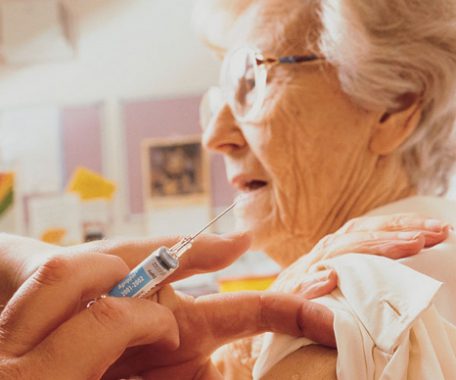Chasing patients up with extra phone calls, emails and text messages to encourage them to come in for a flu jab failed to boost uptake of the vaccine, an audit has found.
The audit, run at a practice in east London, targeted patients in three key at-risk groups – the over-65s, patients with COPD and those with diabetes – in a bid to boost vaccine uptake and improve their QOF achievement scores.
Over a week-long period last December, the practice attempted to contact any patients in each of these groups who had not yet had their jab, with text messages, emails and both home and mobile telephone calls.
The practice audit team – medical students from Barts and the London School of Medicine and Dentistry – used each of these methods to contact the patients in various combinations, including up to three phone call attempts, depending on availability of the patient and their specific contact details on the system.
Patients were given tailored information on why they could be particularly at risk from flu as well as advice about the importance of being vaccinated, and encouraged to book an appointment with the practice to have the jab.
In the audit report, seen by Pulse, the team said that two-fifths of patients received both texts and phone calls, while a third received calls only and around one in ten received a call, text and email. Overall, 12% of the patients could not be contacted.
Following the intervention, QOF reporting figures showed that the proportion of patients vaccinated went up slightly among patients with diabetes (by 5%) and those with COPD (by 3%), while the proportion of over-65s not vaccinated fell by 1%.
However, closer scrutiny showed the intervention had limited impact. Out of the total of 36 extra patients vaccinated, nearly half (16) were simply due to updating records of patients who had already received their jab elsewhere – from a district nurse or at their workplace, or a pharmacy.
Of the remaining 20 to agree to the jab, only three received it within the practice, all at a student-run flu clinic.
Among the patients who declined to be vaccinated, the audit found this mainly related to misconceptions about the vaccine – that it is unnecessary and causes a range of adverse side effects – as well as health and mobility problems that prevented patients from coming in.
The team concluded: ‘This study shows that attempts to intensify patient notification, by email, SMS messaging and phone calling, had no significant impact on improving QOF flu vaccine uptake targets for DM018, COPD007 and the over-65 at risk who have yet to have their influenza vaccine.
‘The two main reasons for this appear to be difficulty in contacting patients and a general lack of interest in getting the flu vaccine among the contacted population despite convenient and accessible flu clinics being organised.’
Dr Andrew Green, chair of the GPC clinical and prescribing subcommittee, said: ‘This study quantifies what every GP receptionist in the country already knew, that there are patients who engage with preventive care, and those that don’t, and it is remarkably difficult to move patients from one group to the other.
‘This is partly because their decisions are based on emotion or pre-conceived beliefs rather than logical arguments.’
Dr Green said practices ‘should neither berate patients who choose to go their own way, nor waste staff time that could be better spent’.
He added: ‘If chasing patients makes little difference to attendance, then using immunisation rates as a measure of quality is clearly invalid.’
GPs pressured to boost flu vaccine uptake
The audit findings come as GP practices are facing increased pressure to try to boost flu vaccine uptake, after coverage in at-risk groups fell last year – despite the introduction of a new pharmacy scheme.
NHS England has claimed that the pharmacy scheme should help to capture hard-to-reach patients who would otherwise miss out on the jab, but GP leaders argue that pharmacists are simply making it harder for GPs by competing for ‘low hanging fruit’.
NICE also recently called for GPs to do more to proactively chase up children and young people who fail to get fully vaccinated, as official figures show a fall in uptake over the past three years.
Pulse July survey
Take our July 2025 survey to potentially win £1.000 worth of tokens














